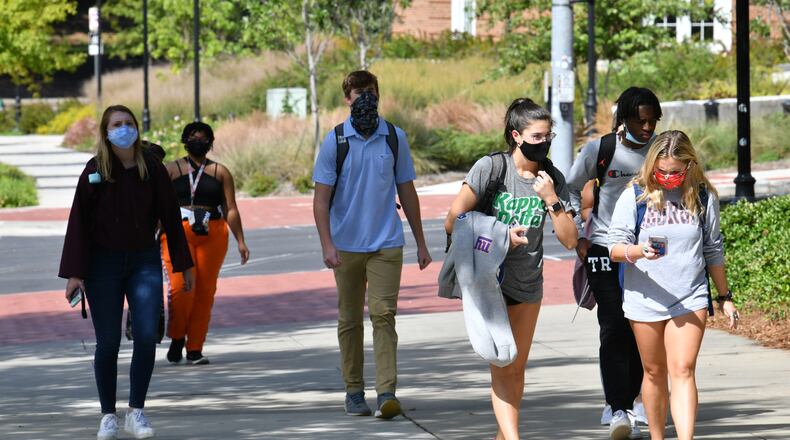With the number of coronavirus cases on a steady decline, Georgia is finally out of the COVID-19 red zone.
Georgia reported the 23rd-highest rate of case growth in the United States from Sept. 19 to Sept. 25, according to the White House Coronavirus Task Force, which moved Georgia out of its most severe category. It’s a marked improvement from mid-August, when Georgia reported the highest rate of new cases in the nation.
Georgia reported 92 new cases of the coronavirus per 100,000 people in the week ended Friday, Sept. 25, one case below the national average for that period. It was the first time Georgia reported a new case rate below the national average since June, according to a review of task force reports published online by the investigative journalism nonprofit Center for Public Integrity.
There are other signs of improvement in the fight against COVID-19. The positivity rate for coronavirus tests is also down, and the number of people in Georgia hospitalized for COVID-19 has also been declining over the past several weeks.
“When we are moving in the right direction, it does not mean we’re out of the woods,” said Dr. Sarita Shah, a physician and associate professor of global health, epidemiology and infectious diseases at Emory University’s Rollins School of Public Health.
Here’s a look at major pandemic developments in the state over the past week:
Credit: HYOSUB SHIN / AJC
Credit: HYOSUB SHIN / AJC
UGA, other colleges see major declines in coronavirus cases
University of Georgia officials reported a third consecutive weekly decline in positive COVID-19 cases.
The university reported 63 positive cases from Sept. 21 through Sept. 27. It reported 170 cases between Sept. 14 and Sept. 20.
Just a few weeks ago, UGA reported more than 1,500 new cases in a seven-day stretch, sparking major concerns among university administrators, parents and students. The most recent total is the lowest total since the week before the semester began Aug. 20.
UGA officials were pleased with the numbers, but disappointed that more students aren’t being tested. On-campus testing for students not experiencing symptoms declined from a record high of 1,974 tests during the five-day stretch of Sept. 14-18, to 1,490 tests during the five-day period of Sept. 21-25.
Many other Georgia universities have reported sharp declines in coronavirus cases in recent weeks.
Georgia College and Georgia Tech reported 7 and 12 cases, respectively, in the last seven days of reporting available. Georgia Southern University reported 19 cases, 16 of them self-reported, between Sept. 21 and Sept. 27. Kennesaw State University reported 46 cases in its most recent seven-day stretch, a decline from 174 cases in a weeklong stretch a few weeks ago.
Credit: Steve Schaefer
Credit: Steve Schaefer
Metro jobs see gains, though painfully slow
Metro Atlanta added 24,200 jobs in August, helping to nurse along the region’s economic recovery from the coronavirus. But there’s still a long way to go in the return to anything close to pre-pandemic times.
Roughly 140,000 fewer jobs exist today than in February, said Michael Wald, former senior economist at the U.S. Department of Labor.
The region’s unemployment rate did fall from 8.6% in July to 6.3% in August — generally a good sign. But the decline this time was largely because so many people have stopped looking for work and were not included in the calculation, Wald said.
Hiring is strong at e-commerce companies, as well as at some manufacturers and logistics firms that have prospered during the pandemic, he said. The worst job losses are in hospitality. Restaurants, bars, hotels, and event facilities shut down, and some never reopened. Those that did reopen found themselves bearing added costs and seeing limited revenues.
President’s positive COVID-19 diagnosis triggers shockwaves in Georgia
President Donald Trump’s disclosure that he has contracted the coronavirus sent a shudder across Georgia, as politicians and activists wondered how vastly it would upend an already tight competition for the White House, two U.S. Senate races, and other consequential contests.
With polls showing Trump and Democratic candidate Joe Biden deadlocked in Georgia, the announcement of the president’s COVID-19 diagnosis shifted attention toward his handling of an outbreak that has killed more than 207,000 people in the United States.
State Republican and Democratic leaders offered get-well wishes, including Atlanta Mayor Keisha Lance Bottoms, one of the highest-profile politicians in Georgia to contract the disease. “A COVID-19 diagnosis is unsettling,” she said, “and even more so when a loved one also tests positive.”
The political fallout was unclear, though it seemed certain that Trump’s rallies over the final stretch of the race would be delayed or canceled. The president last visited Georgia on Friday to court Black voters, mindful of close polls in a state that Republicans have held in every White House race since 1996.
Staff writers J. Scott Trubey, Eric Strigus, Michael E. Kanell, and Greg Bluestein contributed to this article.
About the Author
The Latest
Featured





